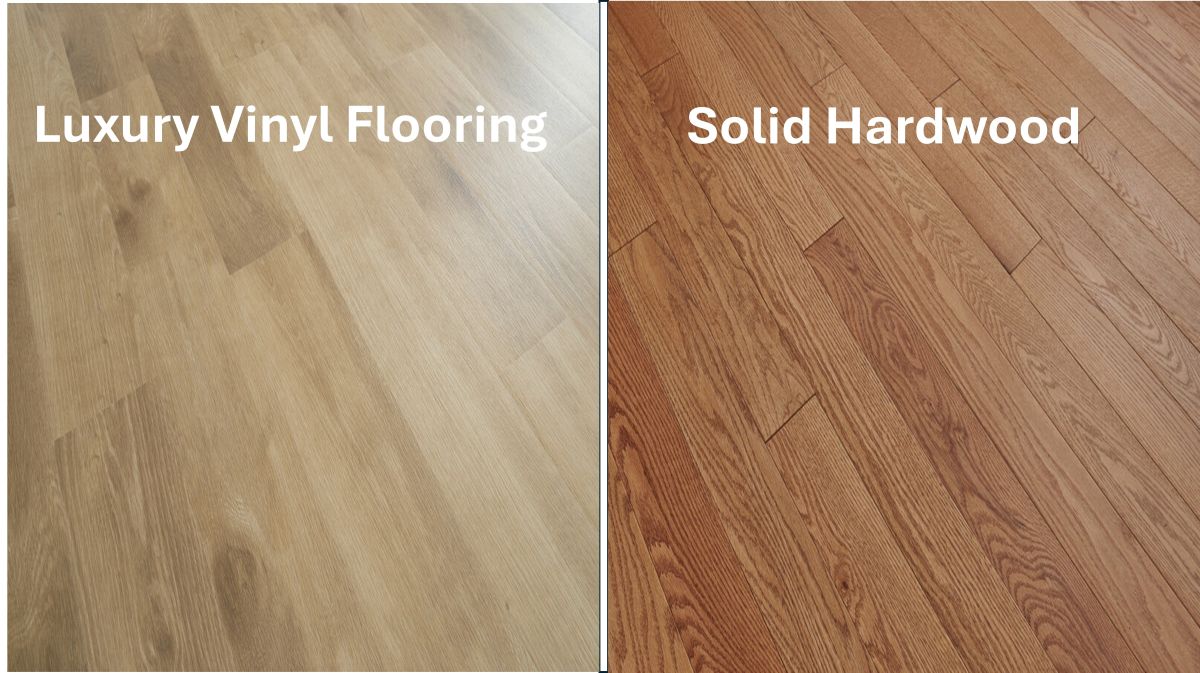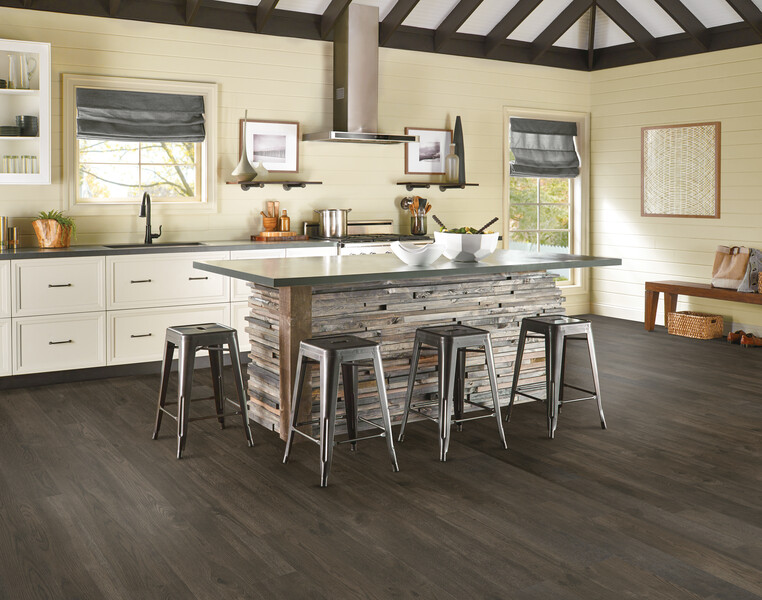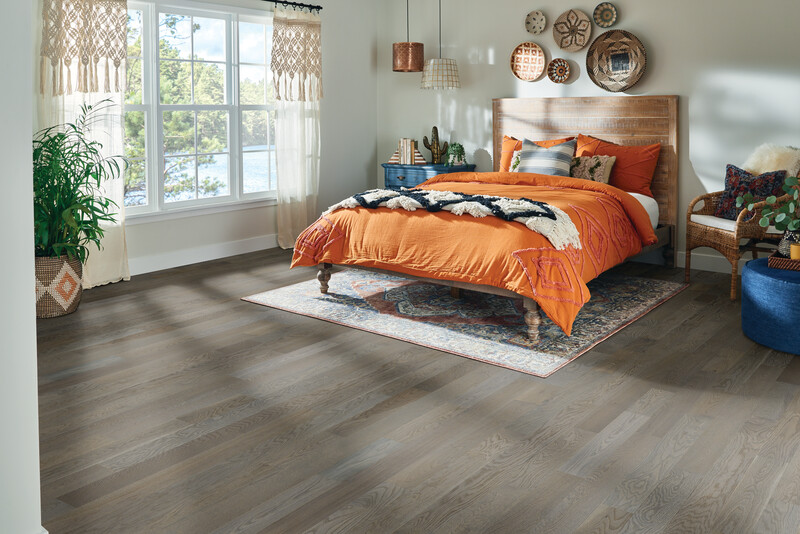Luxury Vinyl Flooring vs Hardwood – Which to Choose?
May 5, 2025
Choosing the right flooring is no small task. It affects your home’s look, feel, durability, and value. Two of the most popular choices today are luxury vinyl flooring vs hardwood. Both offer distinct advantages.
In many cases, which you choose isn’t a matter of which selection is better. Instead, it’s a matter of which works better where you want to use it. What works well in one room might not work equally well in another.
We’ll break down the pros and cons of luxury vinyl vs. hardwood flooring to help you decide which better suits your needs.

Hardwood vs Luxury Vinyl: Quick Comparison
Before we dig deeper, here’s a side-by-side look at how these flooring types stack up:
| Feature | Hardwood Flooring | Luxury Vinyl Flooring |
| Look | Authentic natural wood | Mimics wood floors well |
| Durability | Can scratch or dent easily | Highly resistant to scratches and dents |
| Water Resistance | Poor (especially solid hardwood) | Excellent water resistance |
| Maintenance | Needs refinishing, regular care | Easy to clean, minimal upkeep |
| Installation | More complex (hardwood plank install) | DIY-friendly click-lock options |
| Longevity | Can be refinished multiple times | Can’t be refinished, shorter lifespan |
| Cost | Higher upfront investment | Budget-friendly, stylish floors offering |
| Resale Value | High, especially with solid hardwood | Moderate, depends on quality and look |
Hardwood Flooring: Classic, Natural, and Long-Lasting
Let’s start by diving deeper into solid hardwood flooring, a gold standard for decades. Whether it’s solid hardwood or engineered hardwood, it brings real character to a home. No two wood floors are alike, thanks to the graining and color variations inherent to each hardwood species.
Hardwood floors come in two flavors: solid and engineered. With the former, each plank represents a single piece of hardwood from top to bottom. Hardwood is durable, with some species more durable than others, namely hickory, maple, and oak.
Unfortunately, hardwood has one considerable downside—water. When exposed to water, it swells and contracts, often leading to warping and cupping. Water can come from spills or even humidity changes.
On the other hand, engineered hardwood uses genuine hardwood but only on the surface layer. The core uses high-density fiberboard (HDF) or plywood with layered construction. That adds stability to each plank and bakes in a level of water resistance. Even with that, it’s best to wipe up spills sooner rather than later.
The chart summarizes the pros and cons of hardwood flooring.
| Hardwood Flooring – Pros | Hardwood Flooring – Cons |
| ✅ Real wood look and feel that never goes out of style | ⚠️ Sensitive to water damage — not ideal for bathrooms, laundry rooms, or basements |
| ✅ Adds substantial resale value — buyers love wood floors | ⚠️ Susceptible to scratches and dents, especially in high-traffic areas or homes with pets |
| ✅ Can be refinished multiple times (solid hardwood), lasting 50+ years | ⚠️ Higher cost for materials and installation |
| ✅ Engineered hardwood offers better stability in humid environments | ⚠️ Requires ongoing maintenance, including refinishing if damage |
Where to Use Hardwood Flooring
Hardwood flooring shines in spaces where visual impact and long-term value are a priority. Its rich, natural look adds character to any room and, especially when well-maintained, appeals strongly to future buyers.
Best areas for hardwood floors:
- Living rooms: They’re perfect places to showcase the beauty of solid wood or engineered hardwood. These spaces typically avoid high moisture and benefit from the warmth and charm of natural wood flooring.
- Bedrooms: Wood floors are Ideal for comfort underfoot and long-lasting elegance. They give bedrooms a timeless appeal without the heavy wear of high-traffic zones.
- Dining rooms: As long as moisture isn’t an issue, dining rooms benefit from the durability and style of hardwood plank flooring.
When to choose hardwood:
- You plan to stay in your home long-term and want floors that can be refinished over the decades.
- You’re focused on resale value and want to invest in real wood for which buyers will pay more.
- You have minimal moisture concerns and don’t mind doing some maintenance to preserve the look.
When to avoid hardwood:
- Anywhere prone to water damage or humidity, unless you use a water-tolerant engineered hardwood. That means basements, bathrooms, powder rooms, laundry rooms, and kitchens.
- Homes with heavy wear from pets or kids, unless you’re prepared for some dents and scratches. Though it’s worth noting that Robbins® offers ArmorWood™ densified engineered hardwoods with 4x the scratch and 6x the scratch resistance of standard wood floors.
Bottom Line: Hardwood floors are a wise choice for homeowners focused on aesthetics, home value, and longevity.
Luxury Vinyl Flooring: Durable, Stylish, and Affordable
Now, let’s turn to luxury vinyl flooring, which has come a long way. Today’s versions can closely mimic the look of natural wood while offering benefits that real hardwood can’t match.
Like engineered hardwood, LVT has a layered approach. It generally consists of four layers:
- Wear Layer: It protects the decorative print layer from scratches, stains, and wear.
- Print Layer: It features a digital image of tile, wood, stone, etc. This layer provides a realistic look to the flooring
- Vinyl Core: The core primarily features PVC resins, calcium carbonate, plasticizers, and UV stabilizers. It creates the floor’s backbone
- Backing: This final layer is water-resistant and often waterproof, adding to the stability of LVT.
This chart summarizes the pros and cons of LVT:
| Luxury Vinyl Plank Flooring – Pros | Luxury Vinyl Plank Flooring – Cons |
| ✅ Highly water resistant — great for kitchens, bathrooms, basements | ⚠️ Not real wood — lacks the authentic feel and aging of hardwood |
| ✅ Resistant to scratches and dents — ideal for high traffic areas, kids, pets | ⚠️ Can’t be refinished — once worn, it must be replaced |
| ✅ Easy to clean and low maintenance | ⚠️ Some lower-quality options can look or feel artificial |
| ✅ Budget-friendly with a wide range of wood-look styles | ⚠️ Generally lower resale value than real hardwood |
| ✅ Easy, often DIY-friendly installation with click-lock planks |
Where to Use Luxury Vinyl Flooring
Luxury vinyl flooring is built for performance. It’s rugged and stylish, and it handles moisture and wear better than most flooring types—all while keeping costs down. If you want the look of wood floors without the stress of upkeep, this is your go-to.

Best areas for vinyl floors:
- Kitchens and bathrooms: LVT is highly water resistant, making it ideal for rooms where spills, steam, and splashes are inevitable. Often, the flooring is even waterproof. For example, rigid core and hybrid resilient vinyl options are 100% waterproof.
- Basements: Solid wood won’t survive the humidity or potential moisture issues in a basement, but vinyl floors will. Note: Engineered hardwoods can handle basements.
- Laundry rooms and mudrooms: These spaces demand durability. Luxury vinyl flooring easily handles wet shoes, laundry leaks, and dropped items.
- High-traffic areas: Think hallways, entryways, and homes with kids or pets. LVT is resistant to scratches and dents and won’t show wear the way hardwood might.
When to choose luxury vinyl:
- You need a floor that’s easy to clean and will not stress you out when spills or scratches occur.
- You’re on a budget but still want stylish, wood-look floors offering a modern finish.
- You want something you can install yourself. Most luxury vinyl flooring uses click-lock systems that make DIY jobs easier.
- You’re updating a rental property or a home you may not stay in long-term.
When to avoid luxury vinyl flooring:
- Projects where resale value is the top concern. Although luxury vinyl looks great, it doesn’t match the long-term appeal of real wood.
- Spaces where extreme heat or direct sun exposure could cause warping or fading. Sunrooms, for example, may need added protection.
Bottom Line: Luxury vinyl flooring is a practical, low-maintenance option for busy households and moisture-prone areas. It’s not solid hardwood, but it’s a wise choice when life demands flexibility and durability.
Which One Is Right for You?
People often like right or wrong answers. However, that’s not the case here. Your choice depends on the space and your goals.
So, determine your goals to help you make the selection. Ask yourself:
- Is the space prone to water damage? Go with luxury vinyl flooring as it takes water better than hardwoods.
- Are you focused on long-term value? Hardwood flooring, especially solid hardwood, adds serious resale appeal.
- Do you need flooring for high-traffic areas? Luxury vinyl plank flooring handles wear better.
- Want the look of natural wood without the cost? High-end vinyl floors can look incredibly realistic.
- Do you want something you can refinish multiple times? Only real wood gives you that flexibility.
Is Luxury Vinyl Flooring or Hardwood Better?
We’ll repeat it. There’s no right or wrong answer about which to choose: luxury vinyl flooring or hardwood. Each option has its strengths. In the battle of luxury vinyl vs. hardwood flooring, the outcome is often a trade-off between authenticity and practicality.
If you need something rugged, easy to clean, and water resistant, vinyl may be better. If you want the warmth and legacy of real wood, and you’re okay with the maintenance, hardwood can’t be beat.
The best floor is the one that fits your life, not just your look.
Robbins offers a broad selection of flooring, from standard options like solid hardwoods to more unique options like hybrid resilient flooring. Many of their selections are backed by lifetime residential warranties.
Find the perfect floor for your space by finding a Robbins dealer near you.

